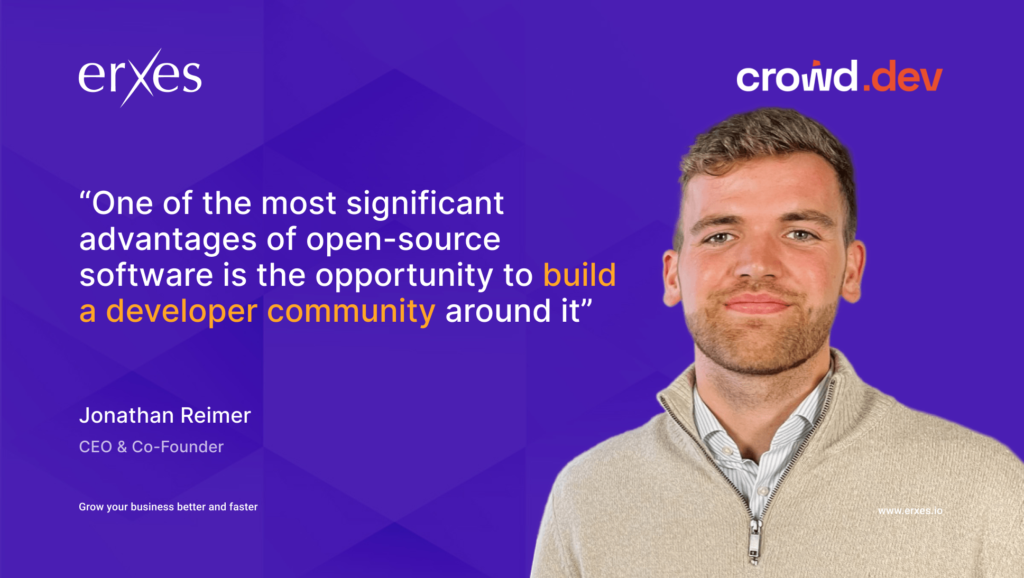Posted in:AllAmplifiersOpen Source Growth Guidebook

This time we had an opportunity to discover Jonathan Reimer’s experience and perspectives on open source , CEO of the crowd.dev’s experience, which is an open-source suite of community and data tools built to unlock community-led growth for organizations, to gain insights into his professional journey and learn more about his involvement in the open source community.
To start off, could you give us an overview of your background and professional journey so far?
I studied Economics at the University of Bonn and started developing a strong interest in the B2B SaaS and Developer Tool space through internships and student jobs.
After finishing my studies I joined Code Intelligence as a Head of Business Development, where I focused on building all things related to their Go-To-Market approach
Throughout my short career,
I noticed the importance of developer buy-in for sales processes but I was always lacking the right insights into this. Hence,my co-founder CTO Joan Reyero and I created crowd.dev, an open-source data platform to centralize community, product, and customer data for companies selling to developers.
Very impressed with your past experiences in the industry. Can you tell us about your experience with open-source software?
I have mostly gained experience from the business side of open-source software, making it commercially viable. Specifically, I have built developer communities at open-source companies like Code Intelligence or Edgeless Systems.
Last year, we also open-sourced crowd.dev.You can find more details about our open-source approach in our launch blog.
Can you share your perspectives on the advantages and limitations of working with open-source software? What are the benefits of contributing to open-source projects, and what challenges have you faced when working with them?
Advantages
One of the most significant advantages of open-source software is the opportunity to build a developer community around it.
At crowd.dev, we see endless use cases for community-led software, and being open-source means we allow for quicker and broader development in this space. By laying the foundations, including building integrations, cleaning and processing data, and matching community members across different platforms, we can build new applications for different use cases more efficiently. While working on many use cases ourselves, we can only get to some on our own. Additionally, being open-source allows for data ownership and access to a great pool of developers who are excited to build an open-source company.
Limitations
One limitation of open-source software is that you have to build and maintain two products – your open-source core and your SaaS. It’s sometimes tricky to balance your resources in between those two.
As someone with vast experience in the tech industry, what recommendations and advice would you give to fellow tech professionals on maintaining motivation and fostering an innovative mindset?
I wouldn’t say that I have vast experience yet, but here are a few things that help me stay motivated:
First, it’s important to only work on problems you are deeply excited about.
There are always ups and downs in any startup journey, even the most successful ones. Staying motivated will be much more challenging if you don’t honestly care about the industry, end-user, or technology.
Second, build a team around you that inspires you to show up every day and have fun building with them.
You can be working on the most exciting projects, but if you don’t like your colleagues, it won’t help. Third, have things outside of work to look forward to; whether it’s your favorite sport or playing an instrument, you need some balance to keep perspective.
Now, a few things are essential when it comes to fostering an innovative mindset.
First, you need to have an open-feedback culture where team members can question and push each other forward.
This includes the team giving candid feedback and voicing their opinions to the founders.
Second, don’t be afraid to change your mind publicly.
It also encourages a culture where it’s okay to fail and make mistakes, whether abandoning a feature you had introduced proudly just prior or taking back a prediction.
Finally, bring in fresh perspectives that are different from yours. This can be through teammates or advisors who don’t think similarly to you. Hosting events and exchanging with others in your ecosystem can also help you to innovate. Overall, I believe that if you focus on staying motivated and fostering an innovative mindset, you can achieve great things as a tech professional.
Thanks for doing the interview with us, it was great traveling through your experiences and perspectives and I’m sure our readers will be inspired.